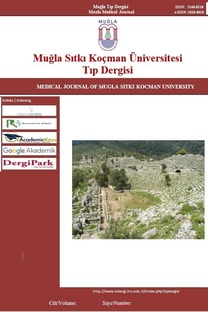İleri Evre Mide Kanserli Türk Hastalarda XPD/ERCC2, RAD51 ve hOGG1 Gen Polimorfizmi
Gen Polimorfizmi, Mide Kanseri, Prognoz, Tek Nükleotid Gen Polimorfizmi
The XPD/ERCC2, RAD51 and hOGG1 Gene Polymorphisms in Turkish Patients with Advanced-Stage Gastric Cancer
___
- 1. Siegel RL, Miller KD, Jemal A. Cancer statistics, 2020. CA Cancer J Clin. 2020;70(1):7-30.
- 2. Chow WH, Swanson CA, Lissowska J, et al. Risk of stomach cancer in relation to consumption of cigarettes, alcohol, tea and coffee in Warsaw, Poland. Int J Cancer. 1999;81(6):871-6.
- 3. Stadtlander CT, Waterbor JW. Molecular epidemiology, pathogenesis and prevention of gastric cancer. Carcinogenesis. 1999;20(12):2195-208.
- 4. Canbay E, Agachan B, Gulluoglu M, et al. Possible associations of APE1 polymorphism with susceptibility and HOGG1 polymorphism with prognosis in gastric cancer. Anticancer Res. 2010;30(4):1359-64.
- 5. González CA, Sala N, Capellá G. Genetic susceptibility and gastric cancer risk. Int J Cancer. 2002;100(3):249-60.
- 6. Yasui W, Oue N, Kitadai Y, et al. Recent advances in molecular pathobiology of gastric carcinoma. In: The Diversity of Gastric Carcinoma. Kaminishi M, Takubo K, Mafune K [eds]. Tokyo Springer-Verlag, pp. 51-71, 2005.
- 7. Wood RD, Mitchell M, Sgouros J, et al. Human DNA repair genes. Science. 2001;291(5507):1284-9.
- 8. Oliver FJ, Menissier-de Murcia J, de Murcia G. Poly [ADP-ribose] polymerase in the cellular response to DNA damage, apoptosis, and disease. Am J Hum Genet. 1999;64(5):1282-8.
- 9. Thompson LH, Schild D. Homologous recombinational repair of DNA ensures mammalian chromosome stability. Mutat Res. 2001;477(1-2):131–53.
- 10. Neumann AS, Sturgis EM, Wei Q. Nucleotide excision repair as a marker for susceptibility to tobacco-related cancers: a review of molecular epidemiological studies. Mol Carcinog. 2005;42(2):65-92.
- 11. Sancar A, Tang MS. Nucleotide excision repair. Photochem Photobiol. 1993;57(5):905-21.
- 12. Kuznetsov SG, Haines DC, Martin BK, et al. Loss of Rad51c leads to embryonic lethality and modulation of Trp53- dependent tumorigenesis in mice. Cancer Res. 2009;69(3):863–72.
- 13. Thacker J. The RAD51 gene family, genetic instability and cancer. Cancer Lett. 2005;219(2):125–35.
- 14. Engin AB, Karahalil B, Engin A, et al. DNA repair enzyme polymorphisms and oxidative stress in a Turkish population with gastric carcinoma. Mol Biol Rep. 2011;38(8):5379-86.
- 15. Hanaoka T, Sugimura H, Nagura K, et al. hOGG1 exon7 polymorphism and gastric cancer in case-control studies of Japanese Brazilians and non-Japanese Brazilians. Cancer Lett. 2001;170(1):53-61.
- 16. Li BR, Zhou GW, Bian Q, et al. Lack of association between the hOGG1 Ser326Cys polymorphism and gastric cancer risk: a meta-analysis. Asian Pac J Cancer Prev. 2012;13(4):1145-9.
- 17. Poplawski T, Arabski M, Kozirowska D, et al. DNA damage and repair in gastric cancer-a correlation with the hOGG1 and RAD51 genes polymorphisms. Mutat Res. 2006;601(1-2):83-91.
- 18. Tsukino H, Hanaoka T, Otani T, et al. hOGG1 Ser326Cys polymorphism, interaction with environmental exposures, and gastric cancer risk in Japanese populations. Cancer Sci. 2004;95(12):977-83.
- 19. Xue H, Lu Y, Lin B, et al. The effect of XPD/ERCC2 polymorphisms on gastric cancer risk among different ethnicities: a systematic review and meta-analysis. PLoS One. 2012;7:e43431.
- 20. Capellá G, Pera G, Sala N, et al. DNA repair polymorphisms and the risk of stomach adenocarcinoma and severe chronic gastritis in the EPIC-EURGAST study. Int J Epidemiol. 2008;37(6):1316-25.
- 21. Takezaki T, Gao CM, Wu JZ, et al. hOGG1 Ser [326]Cys polymorphism and modification by environmental factors of stomach cancer risk in Chinese. Int J Cancer. 2002;99(4):624-7.
- 22. Kawabata M, Kawabata T, Nishibori M. Role of recA/RAD51 family proteins in mammals. Acta Med Okayama. 2005;59(1):1-9.
- 23. Thompson LH, West MG. XRCC1 keeps DNA from getting stranded. Mutat Res. 2000;459(1):1-18.
- 24. Lunn RM., Helzlsouer KJ, Parshad R, et al. XPD polymorphisms: effects on DNA repair proficiency. Carcinogenesis. 2000;21(4):551–5.
- 25. Chen Z, Zhang C, Xu C, et al. Effects of selected genetic polymorphisms in xeroderma pigmentosum complementary group D on gastric cancer. Mol Biol Rep. 2011;38(3):1507–13.
- 26. Yuan T, Deng S, Chen M, et al. Association of DNA repair gene XRCC1 and XPD polymorphisms with genetic susceptibility to gastric cancer in a Chinese population. Cancer Epidemiol. 2011;35(2):170–4.
- ISSN: 2148-8118
- Yayın Aralığı: Yılda 3 Sayı
- Başlangıç: 2014
- Yayıncı: Muğla Sıtkı Koçman Üniversitesi
Paraaortik Lenf Nodu Diseksiyonu Sırasında Unilateral Ektopik Böbrek
Adem YAVUZ, Cevat Rıfat CÜNDÜBEY, Mehmet DOLANBAY
Temporal Triangular Alopesili İki Olgu
Onur GÜRSAN, Mustafa ÖZKAN, Ahmet Emrah ACAN
Künt Travmaya Bağlı İzole Safra Kesesi Hematomunda Konservatif Tedavi
Cem DÖNMEZ, Ezgi DÖNMEZ, Canan GÜRSOY, Funda DİNÇ ELİBOL, Sercan SUBAŞI
Acil Servisimize Başvuran Hastaların 5 Yıllık Analizi
Ekrem Taha SERT, Hüseyin MUTLU, Kerim YEŞİLDAĞ, Kamil KOKULU, AYHAN SARITAS
Adölesan, Normal ve İleri Yaş Gebeliklerde Tiroid Fonksiyonlarının Değerlendirilmesi
Mehmet Ferdi KINCI, Ezgi KARAKAŞ PASKAL, Ercan Saruhan, Yalçın BAŞARAN
İleri Evre Mide Kanserli Türk Hastalarda XPD/ERCC2, RAD51 ve hOGG1 Gen Polimorfizmi
ÖZGÜR TANRIVERDİ, Gamze GÖKÖZ DOĞU, Ayşegül KARGI, HAKAN AKÇA, AYDIN DEMİRAY, Burcu YAPAR TASKÖYLÜ, Atike Gökçen DEMİRAY, Arzu YAREN, CAN ÖZLÜ, AHMET ERGİN
Venöz Numune Almada Preanalitik Hataların Tespiti; Acil Servis Deneyimi
Erdem ÇOKLUK, Mehmet Ramazan ŞEKEROĞLU, Fatıma Betül TUNCER, Fatih GÜNEYSU, Selvihan ÇİLLİOĞLU, Meltem BOZ
